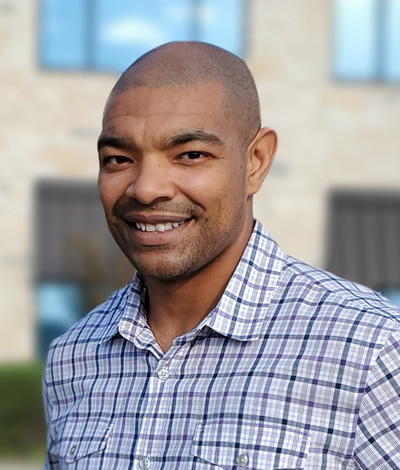ALLEN, Texas – “Box!”
That was the last word Isaiah Creighton heard before collapsing on the mat at his local gym.

Isaiah Creighton
His worst opponent wasn’t looking him in the eye. Instead, Creighton’s body was fighting against him.
Thanks to bystander CPR and emergency care at Texas Health Presbyterian Hospital Allen, Creighton lived to tell his story.
“I woke up with a sore chest, with my wife and parents staring back at me,” Creighton said.
After going into sudden cardiac arrest, gym employees called 911 and began CPR. They continued until paramedics arrived a few minutes later. Creighton was rushed to Texas Health Allen.
“I could have ended up brain-dead or worse,” Creighton said. “Thankfully, I received immediate CPR and got to the hospital in a matter of minutes.”
Putting things together, understanding the cause
Despite being 41 and physically active, Creighton suffers from bradycardia, which is a condition where the heart rate is too slow.
“My paternal grandmother had an irregular heartbeat, so I’ve always been aware of my family’s medical history and made exercising part of my daily routine,” Creighton said. “But my sudden cardiac arrest came as a complete surprise.”
Unfortunately, sudden cardiac arrest is quite common. In fact, the TX-CARES program (Cardiac Arrest Registry to Enhance Survival) determined nearly 60 Texans have a cardiac arrest outside of the hospital every day. And according to the American Heart Association, bradycardia can lead to frequent fainting, heart failure and cardiac arrest.
Getting the necessary treatment
“Most people in similar situations are not as fortunate,” said Dale Yoo, M.D., a cardiac electrophysiologist on the Texas Health Allen medical staff*. “They don’t get the help they need.”
Yoo, who is also the Electrophysiology Program medical director, added that inherent rhythm issues almost never heal themselves. So, he recommended an implantable cardiac defibrillator (ICD) to protect Creighton from a potential future cardiac event.
Yoo emphasized that Creighton did everything by the book — eating the right foods, exercising and getting routine exams — yet he still had a cardiac event.
“It’s very hard to read a book by its cover when it comes to electrical heart disease. Now, we have preventive measures in place,” Yoo said. “If he suffers from sudden cardiac arrest, the ICD will immediately detect it, deliver a shock to his heart, return his heart to a normal rhythm and, most importantly, it will keep him alive.”
Returning to a new normal, full of gratitude and purpose
“So, now I have this 800-watt-sized battery in my chest ready to shock me if I go into sudden cardiac arrest again,” Creighton said. “I can’t say that it won’t happen again, but I’m certainly not going to let it reduce me.”
Back to work and back in the gym, Creighton remains optimistic and focused.
“I made it through a scary moment,” he said. “I want to give others hope, and maybe my story will be a light in a dark place for someone else, because God doesn’t make junk.”
Follow this link to learn more about Texas Health’s heart and vascular services.
*Doctors on the medical staffs practice independently and are not employees or agents of Texas Health hospitals or Texas Health Resources.
Related News
About Texas Health Resources
Texas Health Resources is a faith-based, nonprofit health system that cares for more patients in North Texas than any other provider. With a service area that consists of 16 counties and more than 7 million people, the system is committed to providing quality, coordinated care through its Texas Health Physicians Group and 29 hospital locations under the banners of Texas Health Presbyterian, Texas Health Arlington Memorial, Texas Health Harris Methodist and Texas Health Huguley. Texas Health access points and services, ranging from acute-care hospitals and trauma centers to outpatient facilities and home health and preventive services, provide the full continuum of care for all stages of life. The system has more than 4,100 licensed hospital beds, 6,400 physicians with active staff privileges and more than 26,000 employees. For more information about Texas Health, call 1-877-THR-WELL, or visit www.TexasHealth.org.
